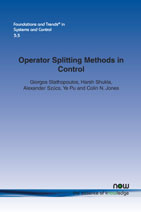Operator Splitting Methods in Control
By Giorgos Stathopoulos, EPFL, Switzerland, georgios.stathopoulos@epfl.ch | Harsh Shukla, EPFL, Switzerland, harsh.shukla@epfl.ch | Alexander Szucs, Slovak University of Technology in Bratislava, Slovakia | Ye Pu, EPFL, Switzerland, y.pu@epfl.ch | Colin N. Jones, EPFL, Switzerland, colin.jones@epfl.ch
Abstract
The significant progress that has been made in recent years both in hardware implementations and in numerical computing has rendered real-time optimization-based control a viable option when it comes to advanced industrial applications. More recently, the need for control of a process in the presence of a limited amout of hardware resources has triggered research in the direction of embedded optimization-based control. At the same time, and standing at the other side of the spectrum, the field of big data has emerged, seeking for solutions to problems that classical optimization algorithms are incapable to provide. This triggered some interest to revisit the family of first order methods commonly known as decomposition schemes or operator splitting methods. Although it is established that splitting methods are quite beneficial when applied to large-scale problems, their potential in solving small to medium scale embedded optimization problems has not been studied so extensively. Our purpose is to study the behavior of such algorithms as solvers of control-related problems of that scale. Our effort focuses on identifying special characteristics of these problems and how they can be exploited by some popular splitting methods.
Operator Splitting Methods in Control
The significant progress that has been made in recent years both in hardware implementations and in numerical computing has rendered real-time optimization-based control a viable option when it comes to advanced industrial applications. More recently, the need for control of a process in the presence of a limited amount of hardware resources has triggered research in the direction of embedded optimization-based control.
Operator Splitting Methods in Control focuses on systems with linear dynamics, giving rise to convex control problems. It provides a comprehensive survey of a family of first order methods known as decomposition schemes or operator splitting methods and shows the behavior of such algorithms as solvers of control related convex problems from tens to a few hundreds of variables.
This compact survey gives the reader a state-of-the-art overview of the topic with examples of applications in aerospace and building control.
